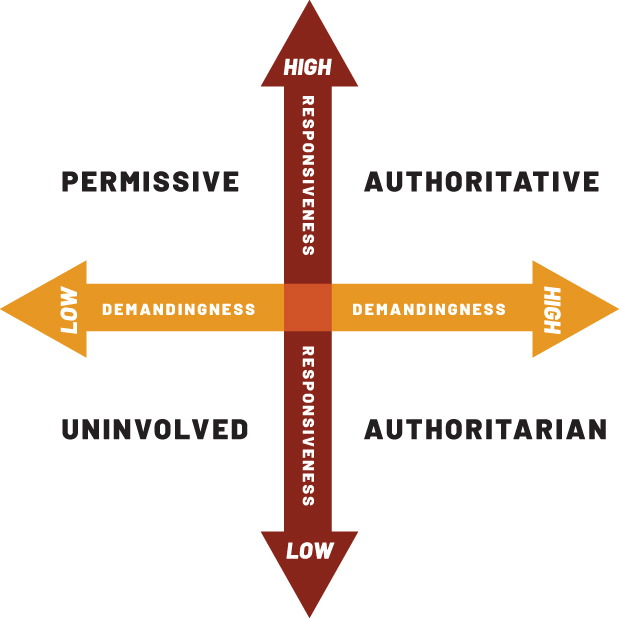I’ve been doing this dad factor for nearly 15 years now. Throughout that point, I’ve learn books and articles about how I could be a higher mother or father.
One parenting framework I’ve discovered useful in rearing my kiddos comes from a baby improvement researcher named Diana Baumrind.
Again within the Sixties, Baumrind noticed how dad and mom and youngsters interacted of their properties. Throughout her research, she seen dad and mom usually resorted to completely different parenting types, which could possibly be positioned alongside two dimensions: responsiveness and demandingness.
In line with Baumrind, various mixtures of responsiveness and demandingness resulted in a number of completely different parenting-style typologies, every of which was related to a corresponding final result in baby habits and well-being.
In immediately’s article, we’ll unpack what these types appear like and which, in line with Baumrind (and subsequent childhood researchers), is one of the best for teenagers.
The 4 Parenting Kinds
First, some definitions of responsiveness and demandingness:
Responsiveness (based mostly on the extent of heat/supportiveness). That is all about how emotionally responsive and attuned a mother or father is to their youngsters. A mother or father excessive in responsiveness is nurturing, affectionate, and accepting. Low-responsive dad and mom are chilly, rejecting, and uninvolved.
Demandingness (based mostly on the extent of management/expectations). That is in regards to the extent to which folks set guidelines and expectations and implement self-discipline. Excessive-demand dad and mom set excessive expectations for his or her youngsters and constantly implement these expectations. Low-demanding dad and mom place few expectations on their youngsters and barely implement the few guidelines they set up.
These two dimensions could be visualized on an x/y axis, with responsiveness occupying the x-axis and demandingness forming the y-axis.
Let’s unpack every quadrant:

Authoritarian Parenting (Low Responsiveness/Excessive Demand)
The authoritarian mother or father is low on responsiveness however excessive on demandingness. That is the “because-I-said-so” mother or father who expects fast obedience with out clarification. Guidelines are non-negotiable, penalties are sometimes harsh, and heat could be briefly provide.
Let’s say a child throws a tantrum as a result of he doesn’t wish to cease taking part in video video games to do his homework.
An authoritarian mother or father’s response to this case may sound like: “Cease being lazy and do your homework now! We aren’t going to debate this! And if I catch you in your Change earlier than it’s achieved, you’ll lose it for a month.”
Youngsters raised with the authoritarian parenting fashion usually tend to be socially withdrawn, extra more likely to be troubled or depressed, and may need habits points once they hit adolescence. The authoritarian parenting fashion doesn’t assist youngsters develop an inside locus of management. They don’t discover ways to govern themselves as a result of they’ve at all times had a mother or father to inform them precisely what to do.
Permissive Parenting (Excessive Responsiveness/Low Demand)
The permissive mother or father flips the script of the authoritarian mother or father. They’re excessive on responsiveness however low on demandingness. This mother or father is heat and nurturing however units few guidelines or expectations for his or her youngsters. Guidelines are at all times negotiable. They keep away from confrontation and sometimes deal with their baby extra like a good friend than somebody they’re liable for guiding.
To the kid who doesn’t wish to cease taking part in video video games to do his homework, the permissive mother or father would say one thing like, “You don’t really feel like doing homework proper now? That’s alright, sweetie. Possibly work on it later, okay?”
As could be anticipated, youngsters with permissive dad and mom wrestle with self-discipline and impulse management, usually tend to be self-centered, and might have a more durable time following guidelines in class or different structured environments.
The kids of permissive dad and mom typically get the message that their needs ought to at all times be accommodated, which doesn’t put together them effectively for the actual world, the place limits and frustrations are inevitable. They have an inclination to flounder in adolescence and younger maturity.
Neglectful Parenting (Low Responsiveness/Low Demand)
Baumrind initially didn’t embody neglectful parenting in her typologies. It was added later by baby improvement researcher Eleanor Maccoby.
The neglectful mother or father is low on each responsiveness and demandingness. This mother or father provides their youngsters neither steering and construction nor emotional help and nurturing. In excessive instances, the neglectful mother or father might fail to even meet their youngsters’s fundamental wants.
A neglectful mother or father doesn’t care if their child performs video video games or does homework. If their baby is having a tough time in class, the mother or father doesn’t even bat an eye fixed. They’re simply fully zoned out in terms of caring for his or her youngsters.
Not surprisingly, youngsters raised with this fashion are likely to fare worst of all. Analysis reveals that youngsters who develop up with neglectful dad and mom typically develop attachment points, are at larger danger for behavioral issues, and usually tend to have interaction in delinquent habits.
Authoritative Parenting (Excessive Responsiveness/Excessive Demand)
The authoritative mother or father is excessive on each responsiveness and demandingness. And in line with Baumrind, it’s the parenting fashion that gives essentially the most advantages to youngsters.
Authoritative dad and mom mix heat and firmness. They set clear expectations for his or her youngsters however clarify the reasoning behind them. They’ll constantly implement the principles, however not rigidly. They’re additionally heat and aware of their youngsters’s wants whereas nonetheless anticipating an age-appropriate degree of maturity from them.
Within the online game/homework state of affairs, the authoritative mother or father would neither give in and let the child maintain taking part in video video games, nor provide a harsh, “Get off now as a result of I stated so!” edict. As a substitute, they might strategy their baby with one thing like, “You recognize the principles. No video video games earlier than homework is completed. For those who end your homework now, you may get again to your Fortnite match. For those who want some assist along with your homework, I’m blissful to assist.”
Youngsters raised by authoritative dad and mom are likely to have one of the best outcomes. In line with Baumrind and subsequent baby improvement researchers, youngsters raised with authoritative dad and mom have higher emotional regulation, carry out higher academically, turn out to be extra self-reliant, and have a better sense of company than youngsters reared with different parenting types.
Parenting Kinds Aren’t Containers — They’re a Versatile Framework
Like quite a lot of recommendation based mostly on psychological analysis, there’s a bent to deal with parenting types as inflexible classes — as if being the “greatest” mother or father means constantly sustaining authoritative mode always.
The fact is that folks naturally shift between completely different types relying on the scenario and their youngsters’ wants.
In case your 5-year-old is about to bolt into site visitors, a stern, authoritarian “STOP RIGHT NOW!” works higher than a heat, reasoned, authoritative clarification about highway security.
Some youngsters thrive with extra nurturing and fewer calls for, whereas others want firmer boundaries. Even the identical baby wants completely different approaches via numerous developmental phases.
One of the best dad and mom aren’t parenting-style purists. As a substitute, they’re those who can learn their baby within the second and reply successfully, even when meaning altering their typical parenting strategy.
In my 15 years as a dad, I’ve used authoritarian, authoritative, and permissive parenting types at completely different instances (I don’t assume I’ve ever been neglectful). I’ve had my days after I completely steadiness heat with clear, agency expectations; I’ve additionally had days when stress and my youngsters’ petulance pushed me into authoritarian drill sergeant mode.
Whereas I’m not an ideal dad, having the parenting fashion framework at the back of my thoughts as I work together with my youngsters has helped me intention for the authoritative preferrred, whereas adjusting my strategy to household life’s ever-changing dynamics.







